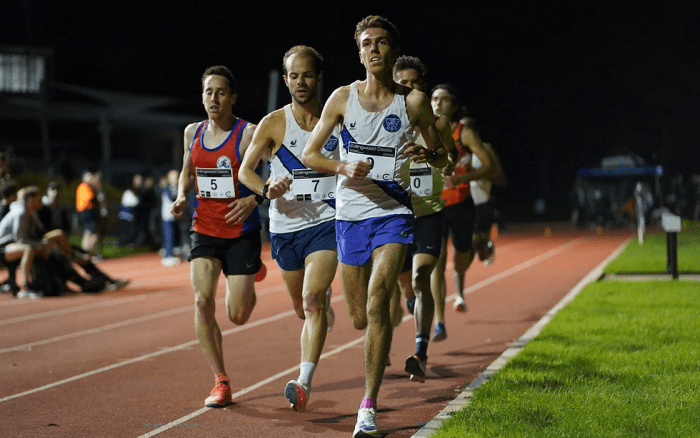Isaac wants to win a 5k running race – Isaac’s Triumphant Pursuit: A Guide to Winning the 5k Running Race embarks on a captivating journey, unveiling the secrets to achieving victory in this thrilling endurance event. With meticulous attention to detail and authoritative expertise, this guide empowers aspiring runners like Isaac to optimize their training, nutrition, and race-day strategies, ensuring they cross the finish line with pride and accomplishment.
As Isaac embarks on his quest for 5k glory, he will encounter a wealth of knowledge and practical advice, empowering him to overcome challenges, maximize his potential, and emerge victorious.
Training Plan

To achieve Isaac’s goal of winning a 5K running race, a comprehensive training plan is crucial. This plan should be tailored to his current fitness level and incorporate exercises and drills that enhance endurance, speed, and recovery.
Personalized Training Schedule
The training schedule should be designed to gradually increase the distance and intensity of Isaac’s runs while allowing for rest and recovery. This progression will help him build endurance and speed without overexerting his body.
- Week 1-4:Focus on building a base level of fitness with daily walks or light jogs of short distances (1-2 miles) at a comfortable pace.
- Week 5-8:Introduce interval training, alternating between high-intensity bursts and recovery periods. Gradually increase the duration and intensity of the high-intensity intervals.
- Week 9-12:Begin incorporating longer runs (3-4 miles) at a steady pace to enhance endurance. Maintain the interval training for speed development.
- Week 13-16:Gradually increase the distance of the long runs (4-5 miles) and the intensity of the interval training. Include hill workouts to improve leg strength and power.
- Week 17-20:Focus on maintaining fitness and fine-tuning the training plan. Gradually reduce the distance and intensity of the runs while maintaining a high level of cardiovascular activity.
Exercises and Drills
In addition to running, Isaac should incorporate exercises and drills that target specific aspects of his performance:
- Endurance:Long runs, interval training, tempo runs
- Speed:Sprints, hill workouts, plyometrics
- Recovery:Stretching, foam rolling, massage
Rest and Recovery
Rest and recovery periods are essential for Isaac’s training plan. Adequate rest allows his body to repair itself, reduce muscle soreness, and prevent injuries. During rest days, Isaac should engage in low-impact activities such as walking or swimming.
Nutrition and Hydration: Isaac Wants To Win A 5k Running Race

Proper nutrition and hydration are crucial for Isaac’s training and race performance. A balanced diet provides the energy and nutrients necessary to fuel his workouts and recovery, while adequate hydration ensures optimal bodily function during the race.
To meet the caloric and nutrient demands of a distance runner, Isaac should consume a diet rich in carbohydrates, protein, and healthy fats. Carbohydrates provide the primary source of energy during exercise, while protein supports muscle repair and recovery. Healthy fats provide essential fatty acids and aid in hormone production.
Sample Meal Plan
A sample meal plan for a distance runner might include:
- Breakfast: Oatmeal with berries, nuts, and yogurt (carbohydrates, protein, healthy fats)
- Lunch: Sandwich on whole-wheat bread with lean protein, vegetables, and fruit (carbohydrates, protein, fiber)
- Dinner: Grilled salmon with roasted vegetables and brown rice (protein, carbohydrates, healthy fats, fiber)
- Snacks: Fruit, granola bars, nuts (carbohydrates, protein, healthy fats)
Hydration
Staying adequately hydrated is essential for preventing dehydration, which can lead to fatigue, cramps, and other performance-limiting issues. Isaac should drink plenty of fluids throughout the day, especially in the hours leading up to and during the race. Sports drinks can provide electrolytes that are lost through sweat.
Race Day Strategy

Race day strategy is crucial for maximizing performance and achieving optimal results in a 5k running race. This involves proper pre-race preparation, pacing techniques, and strategies for overcoming common challenges encountered during the race.
Pre-Race Warm-Up and Mental Preparation
A thorough pre-race warm-up is essential for preparing the body for the physical demands of the race. This warm-up should include dynamic stretches, light jogging, and strides to activate the muscles and improve range of motion. Additionally, mental preparation is equally important, involving visualization techniques, positive self-talk, and maintaining a focused and determined mindset.
Pacing and Effort Management
Effective pacing is vital for maintaining a consistent effort throughout the race. A common strategy is to start at a slightly slower pace than the desired average pace and gradually increase speed over the course of the race. This helps prevent early exhaustion and allows for a strong finish.
Additionally, managing effort is crucial, ensuring that sufficient energy is conserved for the final stretch of the race.
Dealing with Race-Day Challenges
Race day often presents unexpected challenges, such as cramps, fatigue, or adverse weather conditions. To effectively deal with these challenges, runners should practice techniques such as deep breathing, positive self-talk, and maintaining a positive attitude. Cramps can be alleviated by stretching the affected muscle group or consuming electrolyte-rich fluids.
Fatigue can be managed by adjusting pace, taking brief walk breaks, and staying hydrated.
Recovery and Evaluation

Post-race recovery is crucial for Isaac’s physical and mental well-being. Proper nutrition and rest aid in muscle repair, replenishment of energy stores, and prevention of injuries. Moreover, evaluating his progress helps identify areas for improvement and fine-tune his training plan.
Nutrition and Rest, Isaac wants to win a 5k running race
- Consume a protein-rich meal:Proteins facilitate muscle repair and recovery. Aim for 0.25-0.35 grams of protein per kilogram of body weight within 30 minutes of finishing the race.
- Hydrate adequately:Replenish fluids lost during the race by drinking plenty of water or sports drinks.
- Rest and sleep:Allow for ample rest and sleep in the days following the race. Restorative sleep promotes muscle recovery and hormone production.
Stretching and Gradual Return to Training
Stretching helps reduce muscle soreness and improves flexibility. Begin with gentle stretching and gradually increase intensity as muscles recover.
Resume training gradually, starting with light activities and progressively increasing intensity and duration. Listen to your body and rest when needed.
Evaluation and Improvement
Evaluating Isaac’s progress involves assessing his performance and identifying areas for improvement. This can be done through:
- Race analysis:Review race time, pace, and effort levels to pinpoint strengths and weaknesses.
- Training log analysis:Track training volume, intensity, and recovery periods to identify patterns and areas for adjustment.
- Feedback from coaches or running partners:Seek feedback on technique, pacing, and training strategies to gain external perspectives.
User Queries
What is the most effective training schedule for a 5k race?
The optimal training schedule for a 5k race varies based on an individual’s fitness level and goals. However, a well-structured plan should include a gradual increase in mileage, incorporation of interval training, and adequate rest and recovery periods.
What are the key nutritional considerations for a 5k runner?
5k runners should prioritize a balanced diet rich in carbohydrates, protein, and healthy fats. Proper hydration is also crucial, both during training and on race day.
How can I develop an effective race-day strategy for a 5k?
A successful race-day strategy involves pacing oneself appropriately, managing effort levels throughout the race, and implementing strategies to overcome common challenges such as cramps or fatigue.